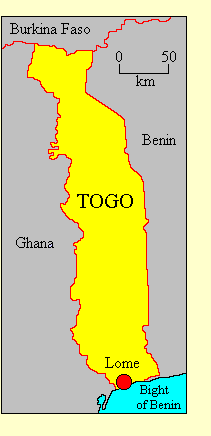
REPUBLIC OF TOGO• Official name: Republique Togolaise (Republic of Togo)
In 1958 a UN-supervised plebiscite saw Togolese vote for full independence, and Sylvanus Olympio was elected president. He was assassinated during an army coup in 1963. In 1967 a second coup brought Lt-Col Gnassingbe Eyadema to power, and he was president until his death in 2005. From 1969 he ruled as a dictator under a typical African one-party regime, but international pressure led him to introduce a new multi-party constitution in 1992. Eyadema and his party, the Rally of the Togolese People (RPT), continue to dominate Togolese politics, and the 2002 legislative elections were boycotted by the opposition Union of the Forces for Change (UFC), led by by Gilchrist Olympio. In 2002 Eyadema amended the Constitution to allow him to seek re-election in 2003. He was duly re-elected, although the opposition again claimed the elections were rigged. Following Eyadema's death in February 2005, the army stepped in, ignoring the provisions of the Constitution, and installed his son, Faure Gnassingbe, as President for the remainder of his father's term. Reasonably fair legislative elections were held in 2007, at which the UPT won more than a third of the vote. At presidential election in March 2010, Faure won a term in his own right by a wide margin, with the opposition again claiming electoral fraud, although international observers did not support these allegations. Freedom House's 2009 report on Togo says: "Togo is not an electoral democracy. Despite international consensus that the 2007 legislative elections were relatively free and fair, the 2005 presidential vote was blatantly fraudulent and marked by serious violence... Corruption continues to be a serious impediment to development and stability, and the government took no significant steps to tackle the problem in 2008. Togo was ranked 121 of 180 countries surveyed in Transparency International's 2008 Corruption Perceptions Index... Freedom of speech and freedom of the press are guaranteed by law. In 2004, the president abolished prison sentences for libel and prohibited the seizure or closure of media outlets without judicial approval. Nonetheless, these changes have been infrequently respected in practice and were blatantly disregarded during the 2005 presidential election... Freedoms of assembly and association have not historically been respected in Togo... The judicial system is understaffed, inadequately funded, and heavily influenced by the presidency. Updated March 2010 |
